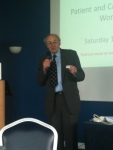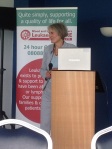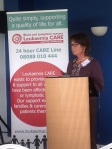Well, look here. Front page of The Independent yesterday with “the news” that CML drug prices are way too high. It’s something we’ve known for ages and it’s fantastic that the damaging price of these drugs is being brought to public attention.
I think it is important that we consider the other side of the argument for a moment though, and this is not an attempt to justify the prices and defend the pharmas. These drugs are saving lives and, in some cases, curing a form of cancer. What price on that? These drugs have revolutionised CML treatment and have certainly kept me alive. Do I care about the price? No. I care that they’ve saved my life and it helps that I live in the UK and don’t have to find that money. Do I care that there are people on this planet dying from CML. YES – and this is the issue. Morally these pharmaceutical companies have an obligation to service each territory to ensure these drugs are available at an affordable price. There are plenty of opportunities to cover research costs but there is bigger picture stuff here…even bigger than the shareholders of these companies. Let’s not use these prices as a stick to beat the industry with, after-all they’ve come up with something truly amazing that is going to change the face of healthcare forever. Instead let’s appeal to their common decency, their moral compass and put the pressure on them to deliver a fair solution. This applies to you too BMS. Your failure to provide a Patient Access Scheme in the England has meant the NHS has not been able to deliver dasatinib as a standard treatment.
What a fantastic opportunity for people to do the right thing. Will it happen? Probably not but I must have faith in the human condition. We can put pressure on the pharmaceuticals, we can write, ask the awkward questions and make sure they know every time a CML patient dies because they can’t afford the treatment they need. Let’s be brave about this, we thank the industry with all our heart, but the time has come to be bigger than the bottom line. Kris
An influential group of cancer experts has warned that the high prices charged by pharmaceutical companies for cancer drugs are effectively condemning patients to death.
The group of more than 100 leading cancer physicians from around the world, including nine from the UK, accuse the drug industry of “profiteering” – making a profit by unethical methods such as by raising the cost of grain after a natural disaster.
Of the 12 drugs approved by the Food and Drug Administration in the US in 2012, 11 were priced above $100,000 (£65,000) per patient per year. In addition the price of existing drugs of proven effectiveness has been increased by up to threefold.
The specialists say: “What determines a morally justifiable ‘just price’ for a cancer drug? A reasonable drug price should maintain healthy pharmaceutical industry profits without being viewed as ‘profiteering’. This term [profiteering] may apply to the trend of high drug prices where a life threatening medical condition is the disaster.”
The high prices mean the drugs may not be approved by the National Institute for Clinical Excellence in the UK forcing doctors to fill in a 14 page application apply to the Cancer Drugs fund for British patients who could benefit from them.
In addition, the rising cost of existing drugs in a cash limited health service such as the NHS means treatment is denied to other patients with other conditions.
The authors of the article, published in the journal Blood, are all specialists in blood cancers such as leukaemia, where cancer drugs have proved most effective.
One of the best known – imatinib, whose brand name is Glivec – has proved so successful in chronic myeloid leukaemia that patients who a decade ago survived for a few years can now look forward to a near-normal life expectancy.
But the cost of Glivec has risen from £18,000 per patient per year to around £21,000 in the UK, and from $30,000 to $92,000 in the US. This is despite the fact that all research costs were covered by the original price, and the number of patients treated and the length of time they are on the drug have both vastly increased because of the drug’s success.
Daniel Vasella, former chairman and chief executive of Novartis, the manufacturer, said the original price charged for Glivec in 2001 was considered “high but worthwhile” and was estimated to yield annual revenues of $900 million, enough to cover its development cost in two years. A decade later Its annual revenues in 2012 were $4.7 billion (£3 billion).
The cancer specialists say the revenue earned by Glivec over the last ten years “represent generous profits to the company”. But this has put heavy pressure on those who have to foot the bill. “Grateful patients may have become the financial victims of the treatment success, having to pay the high price annually to stay alive”.
In the US even those with health insurance may pay an average of 20 per cent of drug prices out of pocket. Drug prices are the single most frequent cause of personal bankruptcies in the US.
Three new drugs have been approved for chronic myeloid leukaemia in the last year by the FDA but the prices are “astronomical” the authors say at up to $138,000 a year per patient.
Worldwide only about a quarter of the patients with chronic myeloid leukaemia who could benefit have access to drugs because of the cost. “A small fraction are rich enough to pay individually, and most are treated intermittently or not at all. The effects of these financial pressures on long term survival… are yet unknown.”
In the UK, patients are shielded from the “direct economic anxieties of illness”, the article says. But Professor Jane Apperley, chair of the Department of Haematology at Imperial College, London, and one of the authors, said high drug prices were still a cause of harm in Britain .
“The price of a drug heavily influences the decision of NICE whether we can prescribe it on the NHS. I am chief of service at Imperial College and we are constantly being asked to reduce our spending. We have to look very carefully at the cost of the drugs we use.”
“Of course we need the pharmaceutical industry to go on developing new drugs. It is very exciting that a number of cancers are now becoming susceptible to these new drugs. But the rising cost is unsustainable. “
“The drugs are very effective at keeping people alive. But if they are priced out of what you can afford you know that you can keep people alive but you can’t afford to do so. It is completely unsustainable for the NHS because the costs are going up every year. We need a serious dialogue about whether we can sustain these costs.”
The authors of the article in Blood conclude: “We believe the unsustainable drug prices may be causing harm to patients. Advocating for lower drug prices is a necessity to save the lives of patients who cannot afford them. We believe drug prices should reflect objective measures of benefit, but should not exceed values that harm our patients and societies.”
The group say they intend to organise regular meetings and campaign for lower cancer drug prices.
A spokesperson for the UK charity Beating Blood Cancers said: “As a charity we want to see an ethical approach to drug pricing . There is no point in us investing in research if the pricing policy means drugs won’t be available to patients.”
In a statement to The Independent, Novartis said: “We recognize that sustainability of health care systems is a complex topic and we welcome the opportunity to be part of the dialogue. Our critical role, as one of many parties working towards improving cancer care, is to discover and develop innovative treatments.”
“ Novartis innovation in chronic myeloid leukemia (CML) has changed the course of the disease. Before Glivec(imatinib)* and Tasigna (nilotinib), the five-year survival in CML was only 30 percent. Today, nine out of ten patients with CML have a normal lifespan and are leading productive lives.”
“Over the years, our programs have evolved to improve patient access to our medicines. We work together with government health care systems, charities and other payers to build successful cost-sharing models.”
Expert view: ‘Price of drugs is harming patients’
The following is an extract from an article, contributed to by more than 100 leading cancer physicians from around the world, including nine from the UK, published in the journal, Blood.
This perspective reflects the views of a large group of CML experts, who believe the current [high] prices of drugs may compromise access of needy patients to highly effective therapy, and are harmful to the sustainability of our national healthcare systems…
If drug price reflects value, then it should be proportional to the benefit to patients in objective measures, such as survival prolongation, degree of tumour shrinkage, or improved quality of life. For many tumours, drug prices do not reflect these endpoints, since most anti-cancer drugs provide minor survival benefits, if at all.
As physicians, we… believe the unsustainable drug prices in CML and cancer may be causing harm to patients. Advocating for lower drug prices is a necessity to save the lives of patients who cannot afford them … For CML, and for other cancers, we believe drug prices should reflect objective measures of benefit, but should also not exceed values that harm our patients and societies.”
An ethical price tag? Cancer drugs
Brands used for the treatment of chronic myeloid leukaemia
Imatinib (Glivec) £21,000 per patient per year – Novartis
Designed from first principles, it proved hugely effective and unexpectedly turned into a blockbuster, earning billions of pounds for its makers.
Nilotinib (Tasigna) £21,000 – Novartis
Designed for patients who fail to respond to Glivec, Novartis reduced the cost to get it past Nice, whilst increasing the cost of Glivec.
Dasatinib (Sprycel) £31,000 – Bristol Myers Squibb
Also designed for patients who cannot take Glivec. But it has not been approved by Nice for use on the NHS because of its high cost.
Bosutinib (Bosulif) £76,000 – Pfizer
For patients who suffer side-effects from the other drugs. It won approval in the US in 2012 but is awaiting a licence in the UK.
Omacetaxine (Synribo) £100,000 – Teva
For patients who cannot tolerate other drugs. Approved in US in 2012 but awaiting licence in the UK.
Ponatinib (Iclusig) £90,000 – Ariad
A third-generation drug which works in a different way. Approved in the US in 2012 but awaiting a licence in the UK.
JEREMY LAURANCE MONDAY 29 APRIL 2013
http://www.independent.co.uk/news/uk/home-news/the-real-cancer-killer-ripoff-prices-for-drugs-set-by-profiteering-big-pharma-giants-8591825.html









